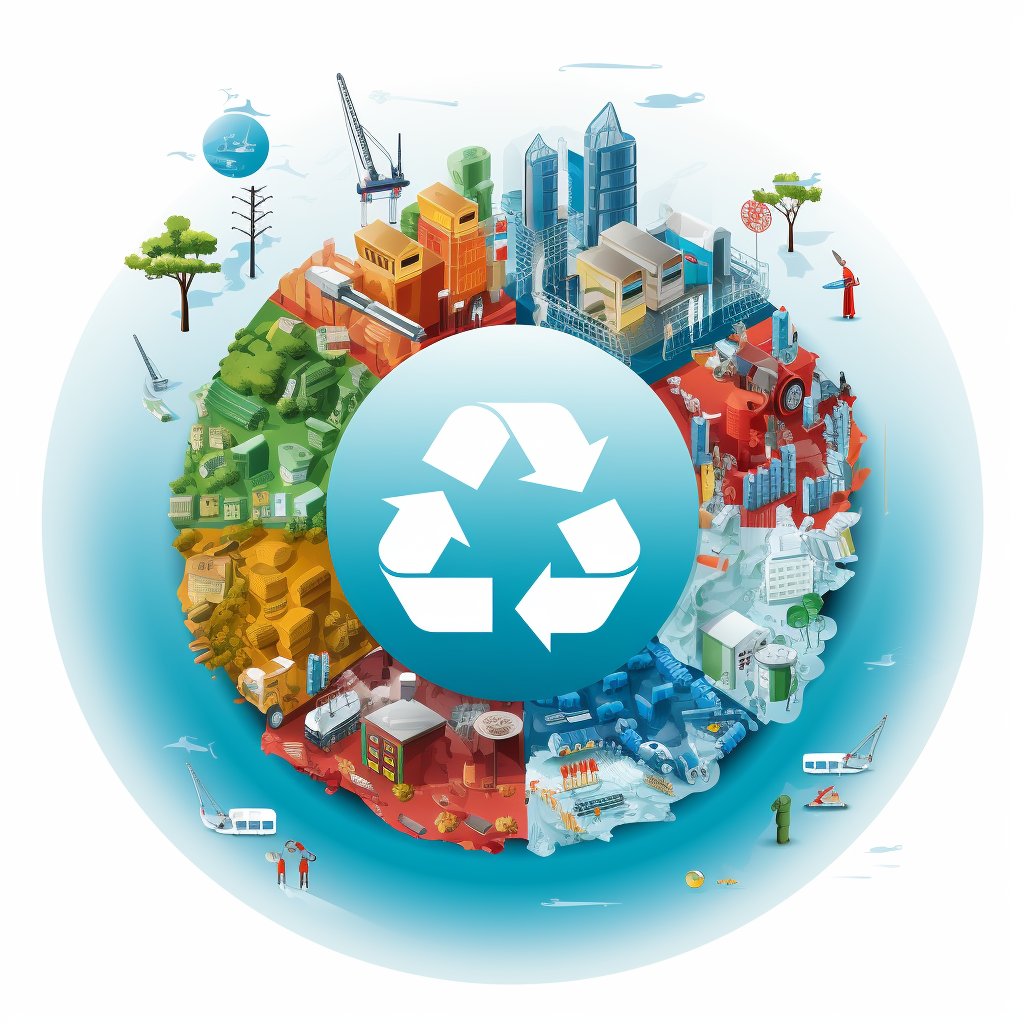Digital deposit systems have emerged as good waste management and recycling solutions in recent years. The system operates on the basis of collecting and recycling waste material, adding a deposit fee to the product at the time of purchase. This fee is returned to the consumer when they return the waste to designated collection points. Digital deposit systems provide an efficient way of recycling plastic waste while generating revenue.
Digital deposit systems are an innovative solution for promoting recycling and reducing waste in various industries, including plastics and packaging. These systems work by incentivising consumers to return used products for recycling, usually in the form of a deposit refund. In recent years, digital deposit systems have gained popularity as a way to tackle the growing problem of waste and pollution worldwide. They are particularly relevant in industries such as plastics and packaging, where the amount of waste generated is significant, and the environmental impact of waste disposal is a primary concern.

Industrial Usage:
Various industries have adopted digital deposit systems for managing waste material. The plastics industry is one of the largest beneficiaries of these systems, as it helps to collect plastic waste. The recycling industry has also implemented digital deposit systems for managing metals and paper. Universities and educational institutions use these systems to manage waste generated on their campuses.
Application Areas:
Digital deposit systems have various application areas, including consumer goods, packaging, and industrial waste. Consumer products such as beverage bottles, food containers, and cosmetics packaging are some of the most common products that use digital deposit systems. Industrial waste management, including electronic and automotive waste management, is another application area of digital deposit systems.
Consumer Product Examples:
The use of digital deposit systems in the consumer goods industry has led to the emergence of several products with innovative material properties. For instance, biodegradable plastic materials that are designed to decompose after a specific period have been introduced. Additionally, some companies are using recycled plastic to produce new products, such as shoes and clothing. Furthermore, some companies are experimenting with digital deposit systems to encourage consumers to return used batteries for recycling.
Material Properties:
The material properties of waste materials collected through digital deposit systems vary depending on the type of material collected. However, the primary focus is ensuring the waste material is recyclable and can be used to produce new products. Most commonly, the materials ordered through digital deposit systems include plastic, glass, and metals.
Future Trends:
Digital deposit systems are expected to grow in popularity in the coming years. The focus will be on improving the efficiency of collection and recycling processes, emphasising reducing costs and increasing revenue. Furthermore, introducing innovative materials, such as biodegradable plastics and intelligent materials that can be tracked and recycled, is expected to drive the adoption of digital deposit systems.
The future of digital deposit systems looks promising, with an increasing number of countries and industries adopting these systems. The focus will be on improving the efficiency of collection and recycling processes and reducing the cost of implementing these systems. Additionally, the adoption of innovative materials, such as biodegradable plastics and smart materials, is expected to drive the growth of the digital deposit systems market. The market is also expected to witness an increase in collaborations between different stakeholders, including governments, recycling companies, and consumer goods manufacturers, to promote sustainable waste management practices.
Different Digital Deposit Systems:
Different types of digital deposit systems have been implemented across the globe. The most common ones include the following:
- Container deposit systems: This system involves adding a deposit fee to the product at the time of purchase, which is refunded when the consumer returns the product to designated collection points.
- Electronic waste deposit systems: This system is used to collect and recycle electronic waste, such as old mobile phones, laptops, and other electronic devices.
- Battery deposit systems: This system encourages consumers to return used batteries for recycling by adding a deposit fee to the product at the time of purchase.
Market Price Developments:
Government policies and regulations have largely influenced the market price developments for digital deposit systems. For instance, countries with high deposit fees for plastic bottles, such as Germany and Norway, have witnessed high recycling rates. Additionally, the market price for recyclable materials, such as plastic and metal, has increased due to the growing demand for recycled products.
Global Impact:
Digital deposit systems have had a significant global impact, particularly in reducing the amount of waste material in landfills and promoting sustainable waste management practices. For instance, countries such as Germany, Sweden, and Denmark have implemented successful container deposit systems, which have led to high recycling rates and reduced littering. Furthermore, the adoption of digital deposit systems has led to a circular economy, where waste materials are used to produce new products, thus reducing the dependence on finite resources.
Global Digital deposit schemes
- Germany: Germany has one of the world’s most successful container deposit systems, with a recycling rate of around 97% for single-use beverage containers. This system has led to a significant reduction in littering and waste and created jobs in the recycling industry. However, there have been concerns about the high costs of implementing and maintaining the system.
- Sweden: Sweden has a comprehensive waste management system, including a deposit system for beverage containers and an extended producer responsibility scheme. This has led to a high recycling rate and a waste reduction sent to landfill. Additionally, the country has generated energy from waste through its waste-to-energy facilities, contributing to its energy security.
- Japan: Japan has a deposit system for beverage containers and a producer responsibility scheme for electronic waste. The deposit system has led to a high recycling rate for beverage containers, while the producer responsibility scheme has encouraged manufacturers to design products that are easier to recycle. However, there are concerns about the high costs of implementing and maintaining these systems and the need to improve collection and sorting methods.
- United States: The United States has a limited deposit system for beverage containers, with only ten states implementing such a system. The recycling rate for beverage containers in these states is higher than the national average. Still, there are concerns about the low participation rate and the need to expand the system to other states. Additionally, national policies and regulations must be improved to promote sustainable waste management practices.
Overall, digital deposit systems have the potential to provide significant environmental and economic benefits, including reducing waste, promoting recycling, and creating jobs in the recycling industry. However, the success of these systems depends on various factors, including government policies and regulations, public participation, and the efficiency of collection and recycling processes. Additionally, there is a need to address the high costs of implementing and maintaining these systems and to explore innovative solutions to improve the sustainability of waste management practices.
Advantages and disadvantages of the digital deposit schemes
Digital deposit systems are an innovative solution for promoting recycling and reducing waste in various industries, including plastics and packaging. These systems work by incentivising consumers to return used products for recycling, usually in the form of a deposit refund. Here are some of the advantages and disadvantages of digital deposit systems, as well as their environmental and global impact:
Advantages:
- Encourages recycling: Digital deposit systems incentivise consumers to return used products for recycling, thus reducing the amount of waste sent to landfills.
- Improves material quality: Products returned through digital deposit systems are typically cleaner and easier to process, leading to better quality recycled materials.
- Creates jobs: The recycling industry creates jobs in collection, processing, and manufacturing, contributing to local economies.
- Reduces environmental impact: Recycling reduces the environmental impact of waste disposal, such as greenhouse gas emissions and water pollution.
- Encourages circular economy: Digital deposit systems help to create a circular economy where waste materials are used to produce new products, reducing the dependence on virgin materials.
Disadvantages:
- High implementation costs: Digital deposit systems require significant investment in infrastructure and technology, which can be a barrier to adoption.
- Limited coverage: Digital deposit systems have yet to be widely adopted, and coverage can be limited to certain products or regions.
- Consumer behaviour: Consumers may only sometimes participate in digital deposit systems, reducing effectiveness.
Digital deposit systems:
Digital deposit systems have emerged as a viable solution for managing waste material and promoting recycling. These systems have been widely adopted in the plastics and recycling industries, as well as by universities and educational institutions. The use of digital deposit systems has led to innovative products with unique material properties, such as biodegradable plastics and recycled products. Additionally, the focus on improving efficiency and reducing costs is expected to drive future adoption of digital deposit systems.
As the world continues to grapple with the issue of waste and pollution, exploring innovative solutions for sustainable waste management is more critical than ever. Digital deposit systems have emerged as a promising tool for reducing waste and promoting a circular economy in industries such as plastics and packaging. Suppose you are a professional in these industries, or a student interested in sustainable waste management. In that case, we encourage you to explore the possibilities digital deposit systems offer.






